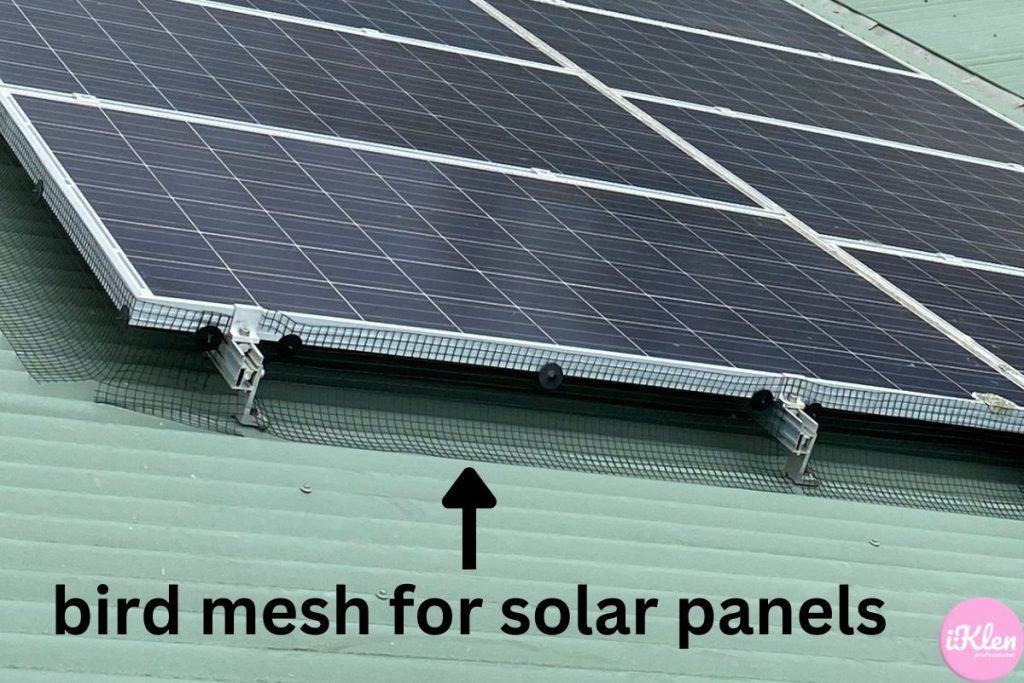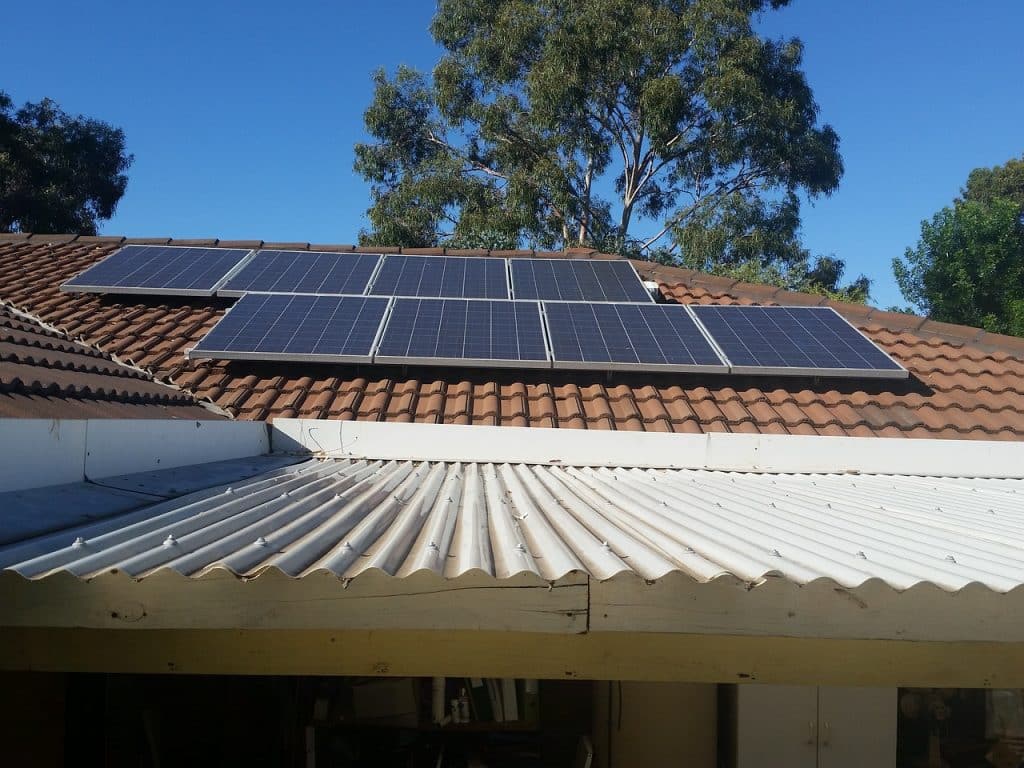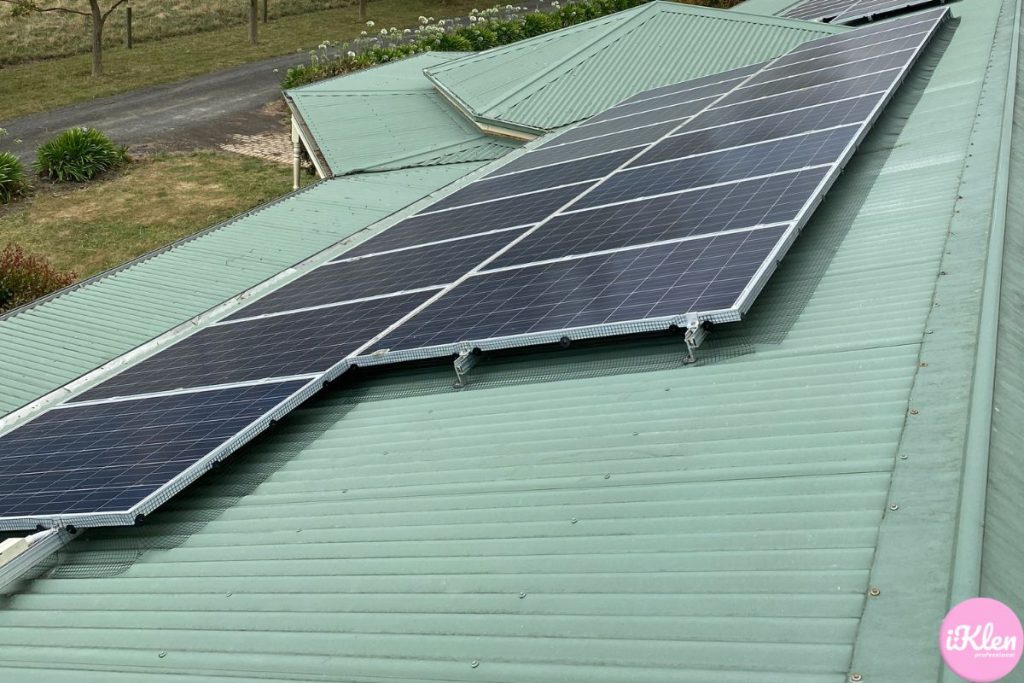With the growing popularity of green energy, solar panels have become a common feature on many rooftops. But just like any other home installation, they come with their own unique set of challenges. One of these challenges is bird nesting.
The Problem with Birds and Solar Panels
Solar panels are typically installed with a little gap between the panel and the roof. This space is cozy, shielded from the elements, and often warm due to the panels absorbing sunlight. Birds, especially pigeons, love such places to build nests.
Now, you might think, “So what? Let the birds have a home!” But here’s the problem:
- Bird droppings can decrease the efficiency of your system and you need to clean bird poop off solar panels.
- The nests can block sunlight and cause hotspots on the panels, reducing their lifespan.
- Birds can chew on the wires, risking damage and fire hazards.
- The noise and droppings can be a nuisance for homeowners.

Does Bird Proofing Solar Panels Work?
Yes, solar panel bird proofing can be very effective when done correctly. Here’s a breakdown of why and how it works:
No Nesting Spot
Solar panels are attractive to birds because the space beneath them provides shelter from the elements. By adding a barrier, you’re essentially eliminating this potential nesting spot.
UV-Stabilized Materials
Quality bird-proofing materials are UV-stabilized, meaning they won’t degrade quickly under the intense sunlight. This ensures that the barrier remains effective over a longer period.
Physical Barrier
Bird-proofing typically involves creating a physical barrier, often in the form of mesh or netting, around the perimeter of the solar panels. This prevents birds from accessing the space beneath the panels, thus deterring them from nesting there.
Mesh Size
The size of the mesh or netting holes is crucial. They should be small enough to prevent birds from squeezing through but large enough to allow for proper ventilation and easy access for maintenance.
Non-Harmful
Bird-proofing methods are typically humane, as they aim to deter birds rather than harm them. This means homeowners can protect their investment without causing harm to wildlife.
Prevention of Other Issues
Aside from preventing nesting, bird-proofing also prevents other related issues, such as bird droppings on the panels (which can reduce their efficiency) and potential damage from birds pecking at the wiring.
Aesthetics and Cleanliness
A properly bird-proofed solar panel setup will be cleaner and more aesthetically pleasing, free from bird droppings and nesting materials.

What You Must Know When Installing Bird Mesh
When performing a Solar Panel Bird Mesh Installation, you need to be aware of:
Installation Quality: The effectiveness of bird-proofing largely depends on the quality of the installation. If there are gaps or the mesh comes loose, birds may find their way in.
Maintenance: Over time, the mesh or netting might need maintenance or replacement, especially if it gets damaged.
Species Differences: Some persistent bird species might still attempt to nest or roost on the panels, even with bird-proofing measures in place.
Bird-Proofing Solutions
Our goal is to prevent birds from nesting under the solar panels without harming them.
Solar Panel Mesh or Netting
This is the most common method. We use a UV-stabilized mesh that doesn’t degrade in the sun. It’s attached to the edges of the solar panels, creating a barrier that birds can’t penetrate. Make sure the mesh size is small enough so birds can’t get their heads through but large enough not to impede airflow or maintenance access.
Does bird netting affect solar panels?
No, bird netting doesn’t affect your panels because it doesn’t cover the surface of the solar panels themselves but is installed around the perimeter. This ensures that the panels receive unobstructed sunlight and can operate at their maximum efficiency.
Spikes
While I personally don’t prefer this solar panel bird deterrent method because they can be unsightly, they’re effective. Birds don’t like landing on spikes, so they tend to avoid roofs that have them.
Slide Guards
These are smooth metal or plastic barriers placed at the edge of panels. Pest birds can’t grip onto them, preventing them from nesting.
Repellents
Some folks use optical gel repellents. Birds see UV light and these gels appear as flames to them. This deters them from landing near the panels.
Maintenance
Encourage homeowners to regularly check and clean under their solar panels. A clean space is less enticing for birds.
How can I keep birds away from my solar panels?
The bird is kept away from solar panels by some means. There are also mesh/bird spikes, reflective mirrors & bird repellents as mentioned above.
What is the best pigeon protection for solar panels?
Having pigeon nesting under solar panels? That’s an annoying problem to have!
The best pigeon protection for solar panels primarily focuses on creating barriers to prevent birds from accessing the space beneath the panels, as pigeons are drawn to the sheltered areas under the panels. The most popular and effective method is using Solar Panel Mesh or Netting, designed to surround the panels, offering a humane solution that’s easy to install and doesn’t hinder panel performance.
Other methods include Slide Guards, which are smooth barriers at the panel edges, Optical Gel Repellents that appear as flames to pigeons, Spikes around the panel perimeter, and Bird Wires that create an uncomfortable landing surface. Each method has its advantages to prevent pigeons from nesting and considerations, like longevity, ease of application, and aesthetics.
What Does It Cost to Bird Proof Solar Panels?
The cost to bird-proof solar panels varies based on factors such as the number and size of panels, chosen bird-proofing method, installation complexity, labor rates, material quality, and geographical location. Bird-proofing with netting for a standard residential solar setup could range from $800 to $1500 or more. However, precise costs depend on specific circumstances especially if a cleaning job is also required.
You can give us a call to get a quote.
In conclusion, while bird-proofing is generally effective, the degree of its effectiveness depends on the quality of the materials used, the installation, and regular maintenance checks. If you’re considering bird-proofing your solar panels, it’s best to consult with a professional service to ensure the best results.
Check our services:

